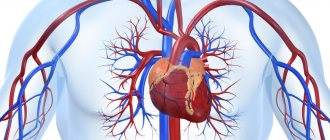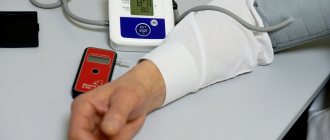Very often, conscripts wonder if they are being recruited into the army under pressure.
In some cases, arterial hypertension is a contraindication to military service. However, there is a possibility that the military medical commission at the military registration and enlistment office may be suspicious of such a diagnosis.
Let’s take a closer look at the pressure under which people are released from the army.
Find out if there are grounds for exemption from the army
Find out if you are fit for the army due to blood pressure or other diseases of the cardiovascular system with the help of our test.
Take the test ~ 1 minute
Can someone with hypertension be recruited for military service?
According to the requirements of the medical commission, hypertension is a non-applicable diagnosis. If a conscript with high blood pressure provides documentation that confirms this diagnosis, or undergoes an examination from the military registration and enlistment office, he will be assigned category “B” or “D”.
However, this only works perfectly in theory. In practice, conscripts who have problems with blood pressure can be recruited for military service. At the same time, calling a person or releasing him from service depends on several factors:
- the conscript must have supporting documentation that he contacted a specialist with such a diagnosis, and did so systematically. If a conscript says he has been diagnosed with high blood pressure, but does not have any doctor’s notes, he can be drafted into the army;
- it is necessary to take into account how stable the high blood pressure indicators are;
- there is written confirmation of the diagnosis from a specialist, which is indicated in the medical record. In fact, this is considered the most important factor, which will be relied upon in the process of passing the medical commission. Please note that the medical record must include a diagnosis of hypertension.
If the medical commission at the military registration and enlistment office confirms the fact of illness, the conscript has the right to be released from the army due to pressure. Point 43 in the Schedule of Diseases stipulates that for the first degree of hypertension, fitness category “B” is set and a military officer is issued.
— Alina Petrova, director of Povestok.Net
The situation is similar with the second stage of the disease - category “B” is assigned when issuing a military ID. Only if a conscript is diagnosed with stage 3 hypertension, he receives a military ID with category “D” and is exempt from conscription. Let us note that the conscription of people with such a diagnosis is prohibited not only in peacetime, but also during war.
It is worth emphasizing that arterial hypertension and essential hypertension are two different diagnoses. And there is a chance to be released from conscription only with a diagnosis of hypertension.
Practice states that if you are diagnosed with hypertension, you can be exempt from conscription only if it acts as a symptom of another disease that is considered non-conscription. A common example is hypertension associated with chronic kidney disease.
Causes and clinic of hypertension
Arterial hypertension occurs when normal blood pressure is insufficient to maintain the required level of blood flow under conditions of significant stress. For example, if you run a hundred meters, your blood pressure will increase during the run. But in a healthy body, after stress ends, it returns to normal quickly and without consequences.
If less stress is enough to increase blood pressure, for example, running ten meters to catch the bus, and normalization is prolonged and accompanied by shortness of breath, this is arterial hypertension, and therefore hypertension.
The medical community now believes that to develop hypertension there must be a genetic predisposition. If a person encounters unfavorable factors, this predisposition is triggered and triggers the development of hypertension. And the factors can be absolutely anything, from physiological to psychosocial.
- Physiological ones include poor nutrition, excess table salt, disrupted sleep and rest patterns, chronic lack of sleep, deficiency of vitamins, microelements, and a number of amino acids.
- Related physical causes are poor quality of water and food, polluted air, unfavorable climate of the area and microclimate of living and/or working premises.
- Among the psychosocial are stresses caused by interaction with other people, for example, at nervous work. Long-term experiences and neurotic mental disorders (neuroses, for example, generalized anxiety or post-traumatic stress disorder) also trigger the development of headache.
- In addition, pathology is also formed secondarily, due, for example, to kidney disease or failures in the body’s humoral (hormonal) self-regulation system - here even without a predisposition.
- A favorable background for the development of hypertension in the presence of a predisposition and in the absence of other reasons is a sedentary lifestyle (physical inactivity), low physical activity, lack of fresh air, obesity.
Hypertension occurs mainly in a chronic form, called essential hypertension - literally translated as existential. Depending on living conditions and the degree of severity, it may practically not manifest itself at all or make itself felt by an increase in pressure to which the body has adapted. But this is possible if you follow a sleep and rest schedule, walks, etc.
Exacerbations of hypertension are called hypertensive crises. They are characterized by an intensification of all essential symptoms, for example, noise, squeaking or ringing in the ears reaches a feeling of deafness. At the same time, the pressure goes off scale, there is some kind of flickering (midges) before the eyes, insomnia, anxiety, and fear appear. Neurological symptoms are also possible: pain in the back of the head, severe dizziness, confusion. A hypertensive crisis is potentially fatal, especially without medical attention.
GB is dangerous due to its systematic nature. Many organs are affected, including the brain, eyes, and kidneys. Blood presses from the inside on the walls of blood vessels, which can lead to their rupture and bleeding. The most innocent option is a nosebleed, the most dangerous is a cerebral hemorrhage, known as a hemorrhagic stroke. Hypertension leads to chronic heart failure. Its course and the risk of exacerbations are increased by other pathologies: aneurysms, encephalopathy, etc.
What are the fitness categories for hypertension?
Category “B”: determined if the conscript has been diagnosed with the first degree of the disease. At the same time, pressure indicators should be kept at a high level - 140-159/90-99 mm Hg. Art. Also, this category is given if the conscript has stage 2 of the disease and high blood pressure on a stable basis - 140-179/90-109 mm Hg. Art.
Category “D”: determined if the conscript has stage 3 hypertension. It is characterized by consistently high levels of 180/110 mmHg. Art.
Sometimes it happens that the draft board makes a decision that does not meet the requirements of the Schedule of Sicknesses. In this case, even conscripts who are diagnosed with stage 2 hypertension, the commission intends to send to serve. This is an illegal decision and must be appealed immediately.
Procedure for exemption from military service
The commission responsible for accepting a conscript is based on strict regulations. Receiving doctors cannot make a diagnosis; their powers are solely to register identified diseases.
That is why, in order to receive a deferment from the army or have a complete exemption, it is important to provide a whole package of documents. In order to confirm or refute the diagnosis, the conscript may be sent for additional examination to a medical institution.
The examination includes different methods
Being registered at the dispensary in accordance with all existing rules and regulations, the diagnosis of hypertension can be made only after six months and not earlier. It is unlikely that it will be possible to provoke pressure once in order to obtain complete liberation from the army.
The certificates provided must have stamps from government medical institutions, since in private clinics such things can be purchased for money. Without such certificates, a conscript will most likely be declared fit and go to serve in the army. You can appeal such a decision through the CMO or the court.
Important! In 2014, a new law was issued regarding the adoption of service. According to Article 43, a conscript is unfit for service if his blood pressure is 140/90.
Is it possible to stimulate hypertension?
Due to simple symptoms, hypertension has become widespread among young people. This may include severe headache, dizziness, numbness in fingers or toes, and feelings of fear and anxiety.
Young people may experience drowsiness, nausea, and even vomiting. Each of these symptoms cannot be confirmed in any way in a medical facility.
One of the methods used to increase blood pressure
If the pressure is always normal, however, it needs to be raised to confirm the diagnosis, young people resort to using many methods. The first of them is coffee. For a glass of water without sugar, take four tablespoons of coffee. It only takes a few minutes for the blood pressure to rise.
Freshly squeezed citrus juice has similar properties. Drinking a large amount of the drink can not only raise your blood pressure, but also cause an attack of tachycardia. It will take a little longer to wait for results from tea with ridge, but even after increasing blood pressure, they will not last long.
For a glass of tea, just take a spoonful of cognac
You can deceive the tonometer in other ways. For example, if you hold your breath and tense your muscles while measuring pressure, the effect will be instantaneous.
The army and hypertension
If the patient has a disability group, then there is simply no need to talk about the army and hypertension.
Disability, in turn, depends on the stage of the disease:
- first – the third group is given;
- second – second disability group;
- third - first group.
Stage 1 hypertension is not an obstacle to service. Often they do not give a disability, but simply make some recommendations regarding their health status.
For example, they may recommend changing jobs and being re-examined several times a year. If high blood pressure was recorded above normal, depending on the situation, group B may be provided, most likely they will be discharged from the army. As for the first stage, it is characterized by fluctuations in blood pressure.
The tonometer reading determines whether a guy will go into the army
Stage 2 hypertension is a limited category. Such conscripts receive category B. However, if concomitant pathologies are identified, they may not be accepted into the army at all.
Most young people with stage 3 hypertension receive category D. It differs in that the pressure constantly fluctuates. Increased physical activity can cause the death of the patient. Such patients are under constant supervision of the attending physician and undergo drug therapy and prophylaxis.
In this case, you can confirm your unsuitability for the army in the following ways:
- undergoing an inpatient examination;
- After treatment, a corresponding certificate must be issued.
A deferment or complete exemption from the army may occur when hypertension was previously identified and documented again.
In the absence of contraindications, there are no obstacles to serving in the army
It also happens that young people do not have time to collect all the certificates on time or some are missing altogether. In this case, it is mandatory to undergo a draft medical commission. It is possible that during the examination, critical pressure indicators will be identified, for which a deferment may be given.
It is important to provide a number of documents:
- discharge from the clinic where inpatient treatment was carried out;
- documented complaints to doctors, where it is indicated that the blood pressure is increased.
Based on the documents received, conclusions are drawn as to whether the young man can join the army or whether he needs a deferment.
What problems may arise upon release?
As a rule, specialists at the medical commission of the military registration and enlistment office are very doubtful about the diagnosis of hypertension. The fact is that conscripts often try to feign symptoms. And, according to doctors, conscripts often use such a diagnosis as a reason to evade service, because it seems that the symptoms of the disease are very easy to fake.
As practice shows, it can be quite difficult to free yourself from military service due to pressure. This is especially true for conscripts diagnosed with the first degree of the disease. There are a number of nuances, taking into account which a military commission can send a conscript to serve. Let's look at each of them in more detail.
Poor preparation
In order to obtain exemption from military service, it is worth collecting all the necessary documentation from medical specialists. The documents that need to be provided to the commission include final examinations in a hospital setting.
It would not be amiss to attach the results of daily blood pressure monitoring under the supervision of specialists, which were carried out at least six months ago. If a conscript does not have appropriate documentation confirming the diagnosis, there is a risk that he will be sent to the army.
Getting tested for another disease
Sometimes conscripts are sent for examination not for hypertension, but for a similar type of illness. For example, the commission often sends patients to neurological departments to check for VSD or neurocircular asthenia. And given that the conscripts initially had a different diagnosis, VSD and NDC are not confirmed and the person is sent to the army.
Problems during additional examination
Before a conscript is issued a military ID, he must undergo diagnosis confirmation from a military commission. To do this, you need to undergo examination in a hospital setting. This is where a number of problems arise.
The military registration and enlistment office may incorrectly issue the referral itself. It happens that instead of hypertension, hospital specialists indicate “arterial hypertension”, mistakenly believing that there is no difference in these diseases. Such conclusions are not accepted by the military commission, given that a diagnosis of “hypertension” is required to be exempt from conscription.
How is hypertension diagnosed?
Diagnosis of hypertension involves several blood pressure measurements (systolic and diastolic pressure readings are written as a fraction). To make a diagnosis of hypertension, at least three blood pressure measurements are required, with a time interval between each measurement.
The systolic pressure indicator (top number) is the blood pressure at the moment of complete contraction of the heart muscle. The diastolic pressure indicator (lower number) is the pressure in the arteries at the moment the heart muscle relaxes.
To diagnose secondary forms of hypertension, additional examinations are required: a general blood test, a general urinalysis, specific blood and urine tests, ultrasound of the heart and internal organs, ECG, various tests, etc.
Problems during additional examination
Before receiving a military ID, the conscript must undergo an additional examination from the military registration and enlistment office and confirm the diagnosis in an inpatient setting. At this stage, conscripts face three problems.
The conscript may not confirm his diagnosis. The examination process requires the passage of a number of specialists, including doctors in the field of urology, neurology, cardiology, ophthalmology, and endocrinology.
During the test, these doctors determine whether high blood pressure may be associated with other diagnoses. If, upon completion of the examination, it is possible to find the cause of the elevated blood pressure, doctors can make an appropriate diagnosis, for example, VSD or NCD. And they are not non-diseases.
As we mentioned above, specialists can diagnose hypertension. As a rule, such a problem is faced by those conscripts who have not previously gone to the doctor with complaints of high blood pressure.
Causes of arterial hypertension
The main reasons for the development of hypertension include:
- Diabetes;
- Kidney diseases;
- Stress;
- Smoking, excessive alcohol consumption, obesity;
- Genetic predisposition.
Symptoms of arterial hypertension:
- Headache, usually in the occipital region, is the main symptom;
- Dizziness;
- Flashing “flies” before the eyes, noise in the ears;
- Shortness of breath on exertion.
Recommendations for parents of conscripts
Before the conscript undergoes a medical examination at the military registration and enlistment office, take enough time to prepare for it. Get examined by specialists, collect all the necessary documentation from doctors: cardiologist, neurologist, endocrinologist.
If this stage is ignored, the conscript may be drafted into service. Since young people often do not understand how to behave in this situation, parents are recommended to go through all conscription procedures together with the conscript.
If you yourself cannot figure out how to provide help to your son, you should contact our company. Our specialists will promptly help you with collecting the required documents for the diagnosis and help you prepare for the medical commission. We also provide legal support at the military registration and enlistment office.
— Ksenia Radugina, Subpoena.No
Hypertension - you need to know the enemy by sight!
Of course, young men of military age diagnosed with hypertension are prohibited from serving, because heavy physical exertion can provoke the occurrence of such serious diseases as a heart attack or stroke. However, it will also not be possible to “dodge” the army by pretending to be hypertensive; doctors will immediately suspect something is wrong and transfer the case to the military prosecutor’s office.
For those who are interested in the question, do people take into the army with hypertension? It is important to know all the symptoms of this diagnosis:
- Noise effects in the ears
- Swelling and puffiness of the face in the morning
- Irritability and anxiety
- Discomfort in the heart area
- Headache
- Nosebleeds may occur
- Memory impairment
- Facial redness
- Numb fingers
- Heavy sweating
As soon as the first symptoms are noticed, experts advise immediately consult a doctor. The specialist will prescribe a comprehensive examination and select the correct treatment algorithm. On our website you can also find out what diseases are not accepted into the army, the specifics of confirming diagnoses at the military registration and enlistment office, and also get advice on army diseases.
Hypotension and the army
What does low blood pressure mean for a young man who is being drafted into the army?
Unlike hypertension, for which, most likely, you will not be accepted into the army, hypotension is not at all a reason for issuing a deferment. However, if in addition to this diagnosis other, more serious ones were made, for example, vegetative-vascular dystonia, then the decision may be different.
It is important to provide the commission with the results of all examinations
Members of the commission are required to consider the symptoms and clinical picture in detail. Pressure can lead to fainting, nervous disorders and heart pain. In this case, the conscript does not join the army because such complaints have bothered him for more than six months. However, it is not enough to talk about this; relevant medical certificates must be provided.
There are medications that can be used to increase blood pressure in this case, but they can be taken provided that the condition is not associated with other diseases.
Of course, for many young guys, being drafted into the army is an important event. However, there is no need to neglect your health, or, on the contrary, take advantage of a minor ailment. Hypertension is a dangerous disease that requires increased attention.
How to apply for a credit holiday and why does the bank refuse?
To apply for a credit holiday, contact your lender. Take with you the contract, passport and summons to the military registration and enlistment office. Call the bank manager in advance to find out an additional list of documents that will be required to apply for a credit holiday. The lender reviews the application within a week and makes a final decision. And military service is one of the reasons why loan holidays are provided.
This means that the borrower will not repay the debt with interest during the year, but will continue to fulfill the obligations after he returns from the army. But lenders do not always make concessions and refuse some borrowers for the following reasons:
- the borrower voluntarily decided to leave work and wrote a statement of his own free will, it turns out that after returning from service he will look for work;
- the borrower was in arrears with payments and was late transferring money.
And banks such as Sberbank and VTB refuse credit holidays even because of one late payment.
Benefits of credit holidays
- The borrower is legally temporarily exempt from paying the loan debt.
- Credit history is preserved.
- There is no need to pay penalties and fines.
- The financial burden is reduced.
Disadvantages of credit holidays
- The interest rate increases after the borrower returns from the army.
- The bank has the right to provide only partial credit holidays and force you to pay interest, but not the principal debt.
- A commission is paid for applying for a credit holiday, which is an additional expense.










